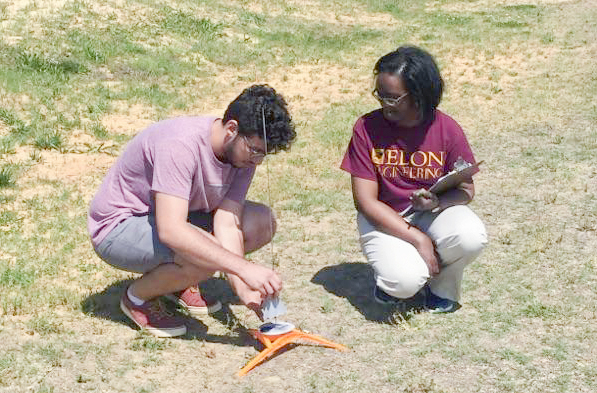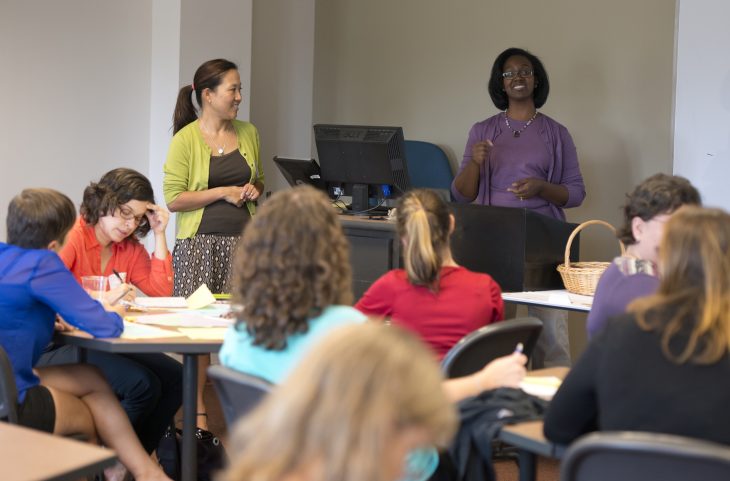Overcoming obstacles to her own education, Associate Professor of Engineering Sirena Hargrove-Leak is focused on helping students rise to meet their potential as the director of Elon's four-year engineering program.
Like a shepherdess over her flock, Sirena Hargrove-Leak keeps watch for the telltale signs of students losing hope.
The weary look of defeat, of resignation to failure, is the outward sign of an inner voice saying: “you don’t belong here” or “you’re not good enough.” That voice is the thief of potential and it requires a vigilant guard. She knows its tricks.
“It breaks my heart to see that discouragement and loss of motivation in their eyes,” Hargrove-Leak, associate professor of engineering and director of the four-year engineering program, says. “Whenever I get the sense that something isn’t right, or that a student is facing challenges, I try to reach out to them to encourage them to keep going. I approach them the way I’d want to be treated. Sometimes they are facing academic challenges and doubting if they can do it, and so I tell them: I know you’re struggling, but you wouldn’t be here if we didn’t believe that you can do this.”
Coaching students into believing in themselves again, she thrives on seeing “the life return to their eyes.”
She recognizes the symptoms because she’s experienced them, too: being the fish out of water, the only woman or only woman of color in the room, being told she doesn’t have what it takes to succeed. She’s spent a lifetime proving those voices wrong. There were times she relied on mentors and trusted colleagues to say “yes” when all she heard was “no.” There were times she relied only on herself.
“The more I tell my story, the more I’m able to enact change and inspire people who look like me to press forward.”
“I want people to know that it’s always been a struggle for me because of my identity, but I’d do it all over again,” she says. “It’s made me a better person, it’s made me a more compassionate person, and it’s shaped me as a person, colleague and professional.”
Hargrove-Leak views her life as a series of steps, leaps of faith and stumbling blocks in pursuit of higher education, each as important as the one before, some more painful than others, but accumulating and culminating in a stronger sense of self and a deep desire to inspire others. When obstacles appeared— and they often did — she pushed through them, proving naysayers wrong, surprising even herself in the process.
“The more I tell my story, the more I’m able to enact change and inspire people who look like me to press forward.”

Hargrove-Leak was raised in rural Vance County, N.C. Her parents espoused the importance of education, urging their children forward. As a child, she was timid behind thick glasses, never quite feeling like she fit in. She describes herself as the “classic nerd.” It wasn’t until junior high when an older neighbor announced an intention to major in chemical engineering at N.C. A&T University in Greensboro that Hargrove-Leak thought clearly about higher education and engineering. She explored the field and she saw how engineering wove together math, science, pharmaceuticals and almost every aspect of life she could imagine. It appealed to her.
Her high school had no honors or advanced classes, though counselors saw promise in her interests. Amid vague ideas of life beyond high school, she recalls an “abysmal existence,” capped by a geometry teacher who made it clear he didn’t believe she belonged or would succeed in his class.
“I made it my personal mission to prove him wrong,” she says. “I’m so proud to say that I did.”
Hargrove-Leak’s path changed in her sophomore year, when her mother told her about the N.C. School of Science and Math in Durham, a residential public school focused on intensive study of STEM subjects. Hargrove-Leak was accepted to the competitive school but turned it down, overwhelmed with doubts about leaving home and her potential for success. It took a phone call from the school’s director and an offer of a personal campus tour and mentorship for her to reconsider. She took his interest as a sign, enrolled, moved to Durham, and thrived.
“It was life-changing. For the first time, I felt like I belonged,” she says.
She also met her future husband there.
While at the School of Science and Math, she had access to faculty and students at N.C. State University, but when searching for a college, she didn’t feel a strong personal connection to that campus. Instead, recalling her neighbor and following in her brother’s footsteps, she enrolled at N.C. A&T where she “sensed they wanted me to be there.”
It was there when Professor of Engineering Shamsuddin Ilias gave her what Elon refers to as “the tap on the shoulder.”
Speaking with her after class, Ilias expressed confidence in Hargrove-Leak’s abilities, encouraged her to pursue graduate school and offered to mentor her. She was surprised but grateful to feel seen. She became a teaching assistant, which she was hesitant about at first. She had visions of a career in industry, “breaking the mold” of her teaching and nursing lineage.

“I fought it like mad, but teaching is in my blood,” she says. “I loved being able to explain something and see the proverbial lightbulb go on in students’ heads.”
She remained at A&T for a master’s degree to continue honing her math and engineering skills. Ilias encouraged her to seek her doctorate in chemical engineering elsewhere for broader perspectives that would make her a better teacher.
She was accepted to the engineering program at the University of South Carolina, an up-and-coming engineering school and university investing in recruiting and retaining African American faculty. As she arrived on campus, opposition appeared again as her graduate adviser expressed doubts about her ability to succeed. “There are some people here who don’t think you’re going to make it,” he told her.
“I had flashbacks to other teachers who’d told me the same thing. I fought back tears. I could not let him see that he hurt me,” Hargrove-Leak says. She chose to stay and do everything in her power to prove him wrong, despite being the only graduate student enrolled in an undergraduate course taught by that adviser. By the end of that semester she’d changed his mind, and he made her semester’s work the solution manual for the course. She earned her degree by sheer force of will.
“It wasn’t easy,” she says. “I worked so hard, shed many tears and had many sleepless nights.”
“It’s the students that motivate me. I see such hope and potential in them. I really care about them and encourage them because I wouldn’t be where I am without people doing that for me.”
Hargrove-Leak came to Elon in 2004, hired as the second engineering faculty member. The university was just beginning its transition into a nationally recognized leader in undergraduate education. She helped implement the human-centered courses and experiential learning that have become hallmarks of Elon’s engineering program. She initiated Engineering in the Village with Elon’s It Takes a Village Project, to bring exposure to higher education to at-risk students in the Elon area. She developed a project within the introductory engineering course that brought engineering lessons to elementary schools, the Burlington Housing Authority and the Salvation Army Boys and Girls Club.
Now Elon’s engineering program is on the cusp of tremendous growth.
This year, Elon established the Engineering Scholars program to attract and retain bright young undergraduates. The program is poised to partner with the National Academy of Engineering Grand Challenges Scholars Program, a supplemental educational program to prepare students to improve the quality of life in the 21st century.
Hargrove-Leak is helming the effort seeking ABET accreditation — signifying the program’s quality and value to potential employers — during the 2020-21 cycle. Elon is seeking grant funding to advance diversity, equity and inclusion within STEM education — something close to Hargrove-Leak’s mission as an educator.
As a physical signifier of this growth and commitment to engineering and STEM fields, Elon has embarked upon building the Innovation Quad that will house science and cross-disciplinary study for decades of growth and progress ahead. A $50 million fundraising effort is underway to complete the first two buildings in the new academic quad, IQ 1 and IQ 2, during the next several years.
Hargrove-Leak looks forward to that future and the possibility of growing thoughtful engineers in the decades to come.
“Our curriculum includes design elements and authentic experiential opportunities each year. My hope is that it becomes a model for other programs,” she says. “But it’s the students that motivate me. I see such hope and potential in them. I really care about them and encourage them because I wouldn’t be where I am without people doing that for me.
“I’m honored to have the opportunity to be a part of their education because I see them as the agents of change that the world needs,” she says.


